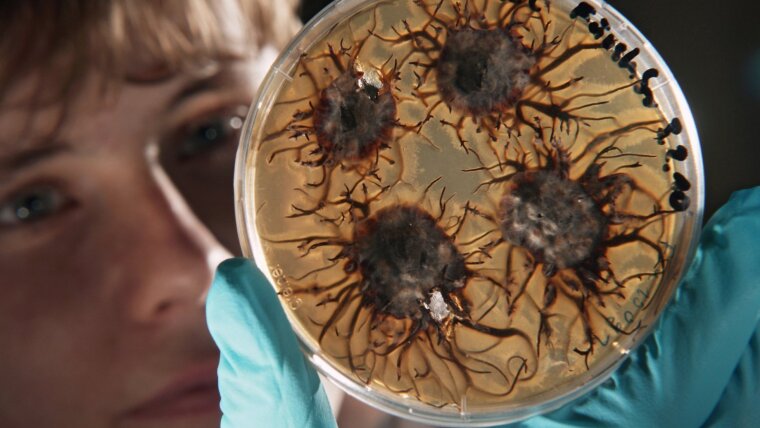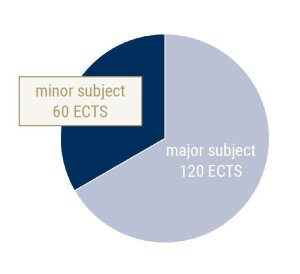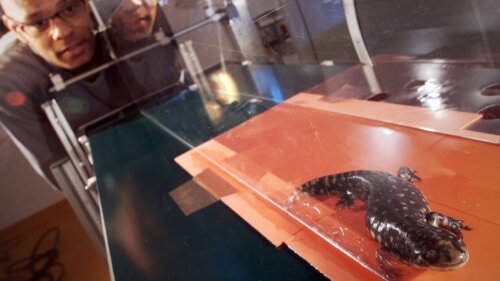
- Degree
- Bachelor of Arts
- Supplement to degree
- minor in a multi-subject bachelor’s programme
- Admission restriction
- without admission restriction (without NC)
- Duration
- 6 Semesters
- Credits/ECTS
- 60
- Teaching language
- German
- Tuition fee
- None
- Semester contribution
- € 272,65
- Start of studies
- Winter semester
- Part-time possible
- Yes
- Institution
- Faculty of Biological Sciences
-
Zoology
- General Zoology (lecture)
- Systematic Zoology (lecture)
- Zoological Biodiversity (practical training)
Total: 12 ECTS
-
Botany
- General Botany (lecture)
- Systematic Botany (lecture)
- Botanical Biodiversity (practical training)
Total: 12 ECTS
-
Ecology
- General Ecology (lecture)
- Human Ecology (lecture)
- Nature Conservation and Environmental Protection (lecture)
- Basic Practical Training in Ecology
Total: 12 ECTS
-
Microbiology
- General Microbiology (lecture)
- Microbial Physiology (lecture)
- Diversity of Microbial Life Forms (lecture)
Total: 12 ECTS
-
Genetics / Bioinformatics
- Genetics (lecture)
- Molecular Evolution (lecture)
- Introduction to Bioinformatics (lecture)
- Bioinformatics (practical class)
Total: 12 ECTS
-
Biochemistry
- Biochemistry (lecture)
- Biochemistry (practical class)
- Biochemistry of Hormones (lecture)
- Fundamentals of Biomolecular Structures (lecture)
Total: 12 ECTS
-
Pharmacy
- Toxicology of Excipients and Harmful Substances (lecture)
- Phytotherapy (lecture)
- Fundamentals of Drug Development (lecture)
- History of Pharmacy (lecture)
Total: 12 ECTS
-
Human Biology
- Human Biology I – Anatomy and Physiology / Ecology (lecture)
- Human Biology II – Evolution (lecture)
- Human Morphology and Evolution (practical class)
- Human Morphology and Evolution (seminar)
Total: 12 ECTS
-
Nutritional Sciences
- Fundamentals of Nutrition (lecture)
- Food Chemistry / Food Law (lecture)
- Fundamentals of Nutritional Sciences (lecture)
Total: 12 ECTS
-
University entrance qualification
A university entrance qualification, such as a general secondary school leaving certificate, is required for admission onto the study programme.
More information on university entrance qualifications can be found here.
-
Language requirements
The study programme is taught in German. You must therefore have a very good command of German at the start of the study programme.
- two modern languages (one of them English or French); proof of the second modern foreign language by the time of registration for the Bachelor's thesis at the latest
Room 138 (1st floor)
Bachstr. 18
07743 Jena
Google Maps site planExternal link
Opening hours:
Thursdays (13:00 – 15:00) and by appointment
Philosophenweg 16
07743 Jena
Carl-Zeiß-Platz 1
07743 Jena
Telephone hours:
Mondays and Fridays (9:00 – 11:00)
Wednesdays (13:00 – 15:00)
The ASPA is primarily responsible for students in the Faculty of Social and Behavioural Sciences, the Faculty of Arts and Humanities, and the Faculty of Theology.
University Main Building / SSZ
Fürstengraben 1
07743 Jena
Google Maps site planExternal link
Office hours:
We offer consultations in person, by telephone, and via Zoom. You can make an appointment by calling us on +49 3641 9-411111 (Mondays to Fridays from 9:00 to 11:00) or outside these office hours on +49 3641 9-411200. You can also use our remote help desk.
Consultation hours:
Mondays, Tuesdays, Thursdays and Fridays (9:00 to 12:20), Tuesdays (14:00 to 18:00), and Wednesdays and Thursdays (14:00 to 16:00).
Video chat: Zoom – Video chat Videochat ZeitenMondays to Fridays (12:30 to 13:00) Password ZSB2020 Data protection informationpdf, 101 kb
University Main Building, Room E065
Fürstengraben 1
07743 Jena
Google Maps site planExternal link
Opening hours:
Mondays (10:00 – 12:00)
Tuesdays (13:00 – 15:00)
Wednesdays (10:00 – 12:00)
Thursdays (13:00 – 15:00)
Fridays (10:00 – 12:00)
You can also use our remote help desk at
www.uni-jena.de/service-ssz
or send us your enquiries by post.
Telephone hours:
Mondays to Fridays
(9:00 – 11:00)
Postal address:
Friedrich-Schiller-Universität Jena
Studierenden-Service-Zentrum
07737 Jena
University Main Building
Fürstengraben 1
07743 Jena
Google Maps site planExternal link

